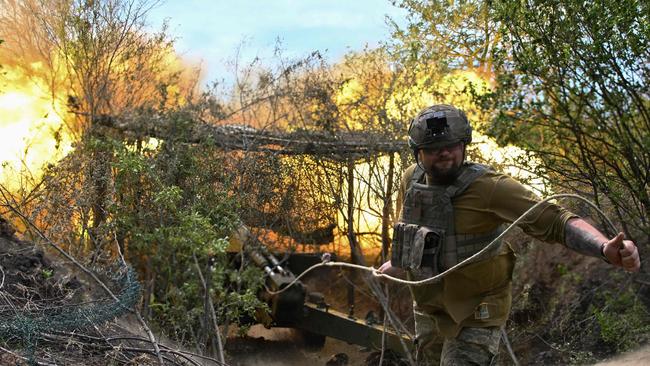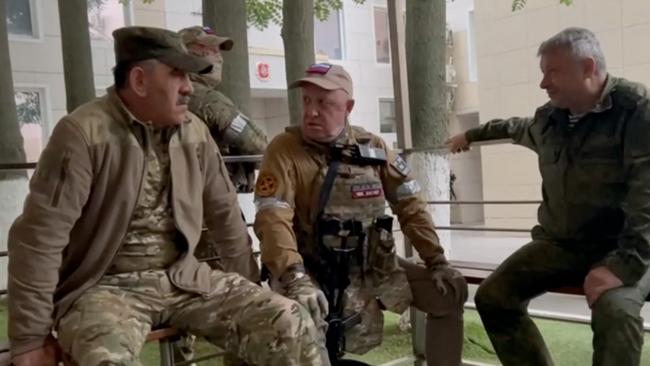Wagner drama in Moscow hasn’t changed anything for us, say Ukraine’s soldiers
Ukrainian soldiers say they regarded the Wagner mutiny as a Russian ploy.

A resigned and wearied realism settled over Ukrainian soldiers as news of Yevgeny Prigozhin’s volte face spread along the Donbas front. Few appeared to have thought the Wagner Group’s advance towards Moscow and the spectre of a Russian civil war would have ever resulted in a speedy collapse of their enemy across no-man’s land.
Many soldiers said they regarded the mutiny as a Russian ploy of some kind or else as merely a complex solidification of power among Kremlin military leaders. None seemed to believe its aftermath would shorten their war or hasten Ukraine’s chances of victory.
“Of course we were happy to see them shoot down their own helicopters and turn on one another,” said Leonid, 31, an infantryman who had kept up to date with the dramas in Russia while sitting in a bunker west of Bakhmut.
“We had fleeting hopes that it would affect the pace of our fight but now we know that Prigozhin has turned back from Moscow it seems like it was just a scene from Game of Thrones or some sort of strange Russian chess move – part of a consolidation of power among big armed gangs that won’t do us much good.”
Hard-bitten by 16 months of intense fighting and overfamiliar with the day-to-day struggles for survival on Donbas battlefields, Leonid’s comrades-in-arms expressed similar jaded outlooks toward the potential benefits.
“Today the war feels just like how it was three days ago,” said Ivan, 29, a special forces soldier with nine years’ service, standing beside his bullet-scarred Toyota.
“All our focus is on our own stretch of the line and all our concern is for our families in cities that are still attacked by missiles and drones. Sure, I had a brief moment of ‘yee-ha’ on Saturday, when I knew that Prigozhin had taken Rostov and then turned to Moscow, which turned today into ‘oh no’ as soon as we learnt he had cut some sort of deal with Putin and turned back.
“The only consolation we have is the knowledge that at least their internal confrontations will somehow demoralise and divide them.”
Yet despite the suspicions of Ukraine’s combat troops, the fallout from Mr Prigozhin’s march upon Moscow – the first time the Kremlin has been challenged by an armed column since Hitler moved on the Russian capital in 1941 — will prevent the earlier status quo of Russia’s war effort from ever returning.

In losing control and losing face during the three days of mutiny, in which he first accused Mr Prigozhin of betrayal and then gave him an amnesty, President Vladimir Putin also lost his key monopoly of state-sanctioned violence. Divisions between senior commanders, already strained since the start of the invasion last year, are unlikely to heal in the mutiny’s wake.
The parallel power structures of armed groups such as Wagner and Akhmad Kadyrov’s Chechen paramilitary units will further incite the military’s internal discord.
Respect for Valery Gerasimov, the chief of defence staff, and Defence Minister Sergei Shoigu was already low before the mutiny, even among commanders supposedly loyal to Mr Putin. On Saturday, when Mr Prigozhin was filmed in Rostov at a meeting with Vladimir Alekseyev, deputy head of Russia’s GRU military intelligence, demanding he hand over the two chiefs’ commander, the GRU officer sneered. “You can take them,” Lieutenant General Alekseyev said.
Nor will the Russian air force soon forget the deaths of crew killed by Wagner fighters. As Wagner columns moved northwards to Voronezh, Mr Prigozhin’s men shot at least three Russian helicopters and one fixed-wing transport aircraft, killing more than 13 crew. The losses, including two rare Mi-8MTPR-1 electronic warfare helicopters and a KA-52 “Black Shark”, have caused outrage among officers – and Russian journalists. Mr Putin’s “amnesty” will have done little to mollify their anger.
As much as the divisions in Mr Putin’s military forces that Mr Prigozhin’s mutiny has ignited, the Wagner Group’s absence from the campaign will carry its own damage to the Russian war effort, on and off the battlefield. The mercenary force, believed to number about 25,000 fighters including a cadre of 6000 highly trained former NCOs and officers, delivered Mr Putin his only significant victory of the year, when they captured the Donbas city of Bakhmut last month after savage attritional fighting. Many Russians will miss them.
Preparing for more conflict in Donbas on Sunday, Ukrainian soldiers professed a grudging admiration for Mr Prigozhin’s mercenaries – but also wondered if the Wagner Group really was finished. “They were Russia’s most skilled fighters, in their way,” said Anton, 35, a Ukrainian special forces soldier who had fought in Bakhmut for three months until the city’s downfall. “They were commanded by experienced operators, who sent well-equipped fighters towards us with a speed and ferocity, not caring for casualties. We still suspect that Wagner will somehow be sent elsewhere to work against us.”
THE TIMES



To join the conversation, please log in. Don't have an account? Register
Join the conversation, you are commenting as Logout